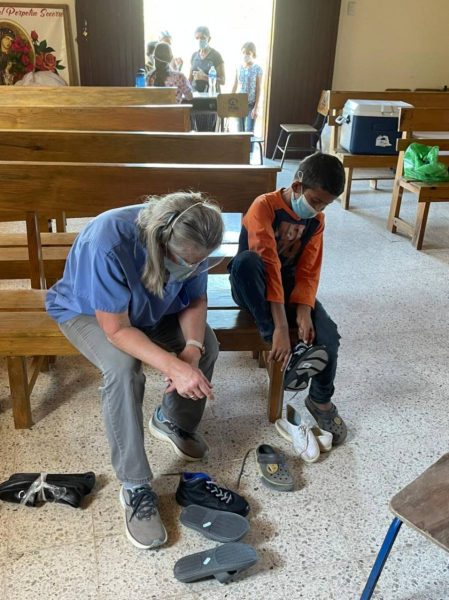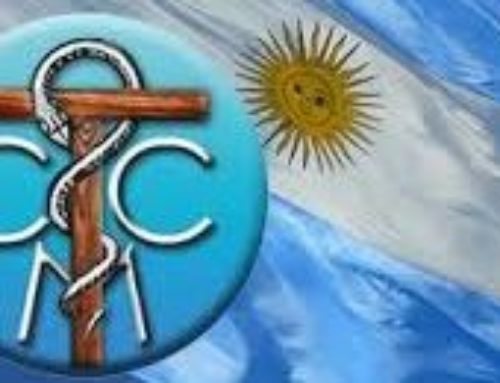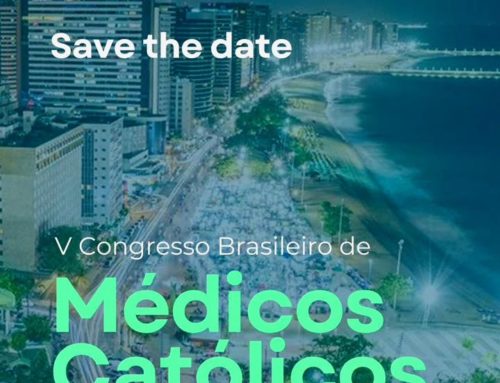BY DEBORAH RODRIGUEZ M.D.

Dr. Rodriguez doing what she loves. Children coloring on floor (2020)

Honduran children keeping busy during a visit (2020)

The gift of shoes (2021)
A general pediatrician here in the United States, I have served as a medical missionary both locally and internationally. It is always a humbling experience to share my God-given gifts with those who would otherwise not receive any medical care. I have the opportunity to walk with and learn from men, women, and children that the world seems to have forgotten.
The poor and the persecuted have taught me more than many of my medical books and classes. I’ve learned over the years that often the best lessons come from those rare and tender moments when two people can be vulnerable with one another and see the other as a valuable and precious gift.
One of those moments happened in a remote village of Honduras. What I thought would be a usual patient encounter turned out to be one of the most sacred moments I have had in my medical career. That day on the mission field started as all do — a long line of patients waiting for our team to arrive in the village to set up the clinic. Some of the patients traveled hours by foot to consult with one of us on the medical team. We brought medications for those with chronic medical conditions such as diabetes or hypertension. We also brought vitamins and a few medications for acute illnesses. But it was our presence and our time that seemed the most valuable.
A 42-year-old single mother, Sophia*, came to me smiling but also a bit hesitant. With her were two sons, ages 10 and 12, whom she insists I take care of first. This is a little different than most of my family appointments; here in the remote villages of Honduras, I have learned that the adults are often attended to first when they come for a “consult” with the doctor. If there is time, then children can be seen.
Sophia’s sons are healthy by Honduran standards — a bit underweight, with only moderate caries, and no sign of chronic disease. They are both still in school, not yet pulled for work in the sugar cane fields. Sophia is happy to hear that I will prescribe vitamins and parasite medications and she sends them out to play with a friend.
Her voice then quiets, and she slowly and hesitantly shares that she has been diagnosed with uterine cancer. It is still at an early stage and surgery has been recommended. However, because she has no funds and she has “borderline” diabetes, she is ineligible for free care at the hospital for the indigent. This means she will likely die from a cancer that in the US can be easily cured. She knows this and soon she begins to cry, not for herself but for her family. She has her boys and her mother to care for as well. Who will provide for them?
I am in shock as I struggle to offer any help I can. With the help of a local physician, we write a prescription for care through another hospital and offer a small amount of funds to help toward her care. She smiles and tells me, “I didn’t come here for a cure to my cancer. I knew you couldn’t do that, but I knew you would listen.” I am speechless, and by that time, we are both in tears. She only needed someone to see her as a fellow human being who like any other person deserves for someone to spend time with her, just needs someone to be with her in her pain, to just see her and love her.
Sophia taught me what it is to be not just a follower of Jesus Christ, but what it is like to serve in His name. She taught me what my vocation as a Catholic physician is. It is not just about curing disease. It is about seeing Christ in another. It is about sitting with another in the heaviness of injustice and persecution. It is about seeing suffering from another person’s eyes and sitting in and with this suffering. It is about inviting Jesus into this moment and letting His presence be the comfort.
Sophia invited me into her story, as hard and as tragic as it is. In doing so, she gave me the gift of knowing why I went into medicine. I wanted to be a doctor not to give out medication, or to receive praise for my medical knowledge. I went into medicine to learn from my patients and, in some small or big way, to bring healing.
The greatest gift I bring to any medical mission is a humble heart. It is when I bring my own poverty of spirit that I encounter the richness of another. As many medical missionaries know, we often leave our host countries richer than when we arrived. The riches we receive come from the people we meet. Being a physician in the name of Jesus means I sit with others, no matter the cost, and see them as Jesus does.
*The patient’s name has been changed to protect her privacy.
Dr. Deborah Rodriguez is a board-certified pediatrician in Federal Way, Washington. She is currently licensed to practice medicine in Washington and Texas. She serves on Catholic Medical Association’s Catholic Social Teaching on Justice in Medicine Committee.






